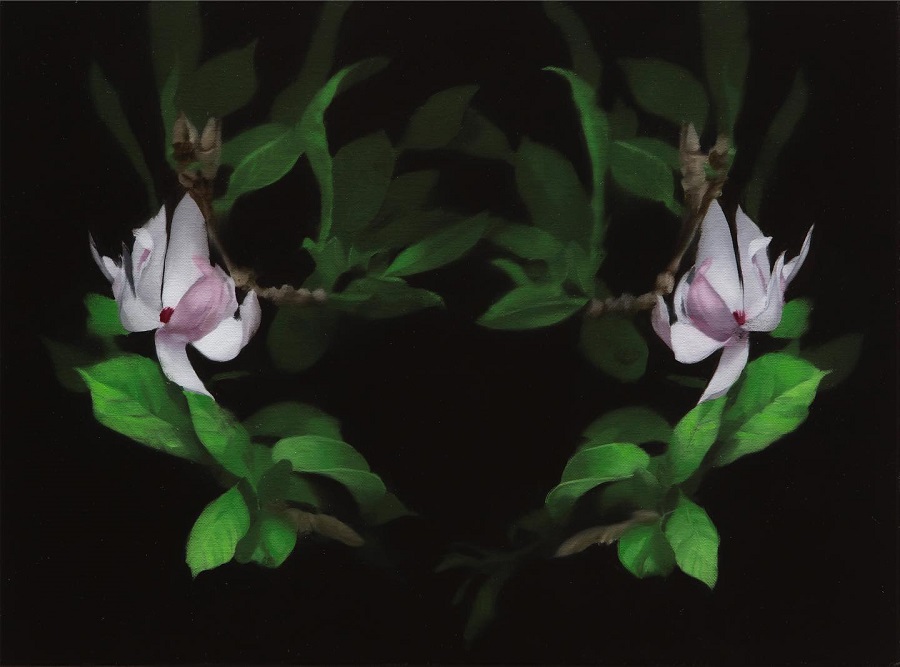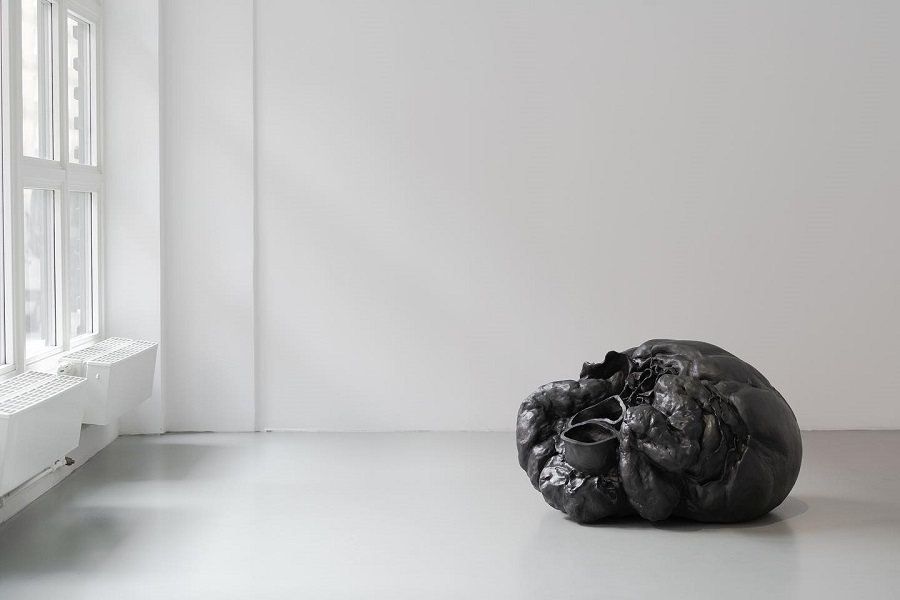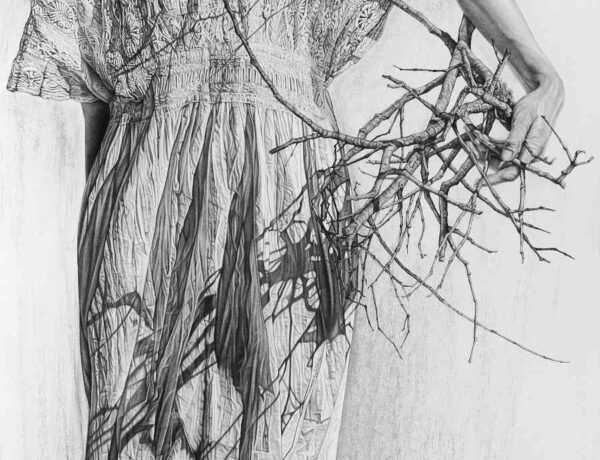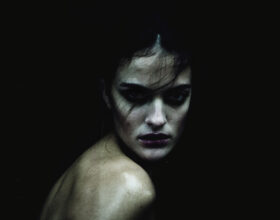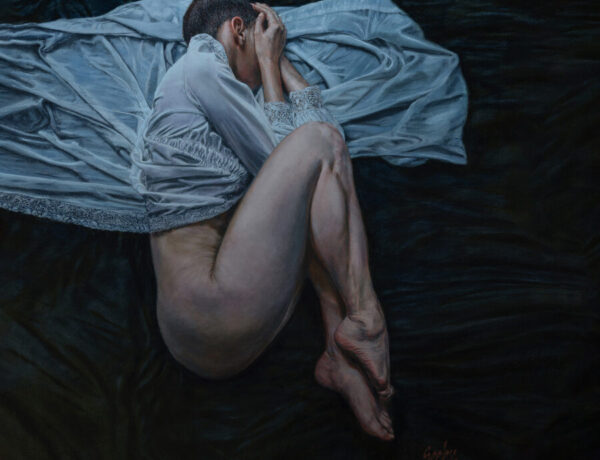Exclusive Interview With Markus Åkesson, 1st Prize Winner of the RAYMAR Traditional Art Award, 2023 Beautiful Bizarre Art Prize
Swedish artist and glass sculptor, Markus Åkesson, emphasizes the visual elements of his contemporary paintings through layers of fabrics and repetitive patterns, light and shadow. A muse born of anonymity, his dynamic aesthetic conceives a moment in time that carves a path from his thoughts to the viewer like a lifeline. He is the master of his imagination, and irrevocably we’re drawn to the compelling, mysterious imagery.
Allowing us to see farther than the unseen, we ponder what lies beneath the veil of each subject. Hidden and constrained in their stoic surrender and sensory deprivation, we grow evermore curious to the secrets they embrace. Deep within the stratum of his ideations, our cognitive minds search for interpretation, both visual and aural, then leverages the imagination deep within his artistic discipline.
Sophisticated and brooding, Markus Åkesson’s protagonists speak to us through the intensity of their body language – a voice often more audible than words. Communicating a sense of spirituality flanked with wistful undertones and conflict, they act as a conduit that garners intrigue and admiration. From conception to completion, the implementation of his impassioned practice lingers.
I had the pleasure of speaking with Markus Åkesson, 1st Prize Winner of the 2023 Beautiful Bizarre Art Prize, RAYMAR Traditional Art Award, to learn more about his wining piece “Witch Riding Backwards (Indigo)”, the evolution of his work, artistic narrative, and so much more. We hope you enjoy!
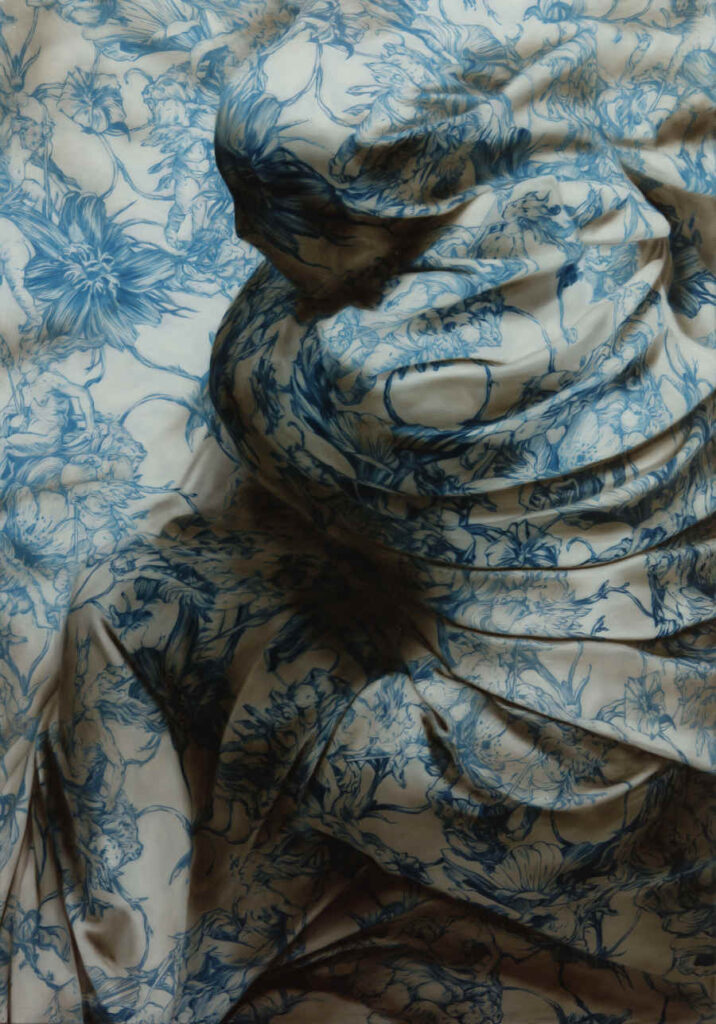
Oil on canvas, 145 x 100 cm
1st Prize Winner
2023 Beautiful Bizarre Art Prize RAYMAR Traditional Art Award
About the Artist //
Markus Åkesson (b. 1975) lives and works in Nybro, Småland, Sweden. He has been participating in a large number of exhibitions at galleries, art fairs and institutions in Paris, Berlin, Brussels, London, Vilnius and Sweden.
Markus Åkesson had an early focus on the French art scene and has made several solo exhibitions at Galerie Da-End in Paris (the most recent in the winter of 2022-2023, with the solo exhibition “The Roses of Heliogabalus”) and the French art fairs Galeristes, Art Paris and YIA Art Fair. In Sweden he is represented by Berg Gallery in Stockholm, where he has shown his works in several solo and group exhibitions since 2021. He has also been shown in several solo exhibitions at VIDA Museum, Öland, Sweden and in the retrospective exhibition “Sleeping Beauty” at Kalmar Art Museum 2018, one of the museum’s most visited exhibition to date.
Åkesson is represented by The Public Art Agency of Sweden, Fondation Francès, VIDA Museum, Småland Museum as well as in several private collections, including Alice Walton Family Collection, Château du Rivau, and Jacques-Antoine Granjon Collection. He has made several public commissions, the most recent being the bronze sculpture “When the leaves come falling down” for a church in Småland, Sweden and the most controversial being the large painting “Sleeping Beauty” which was relocated from the entrance of the Swedish school that commissioned the work in 2017.
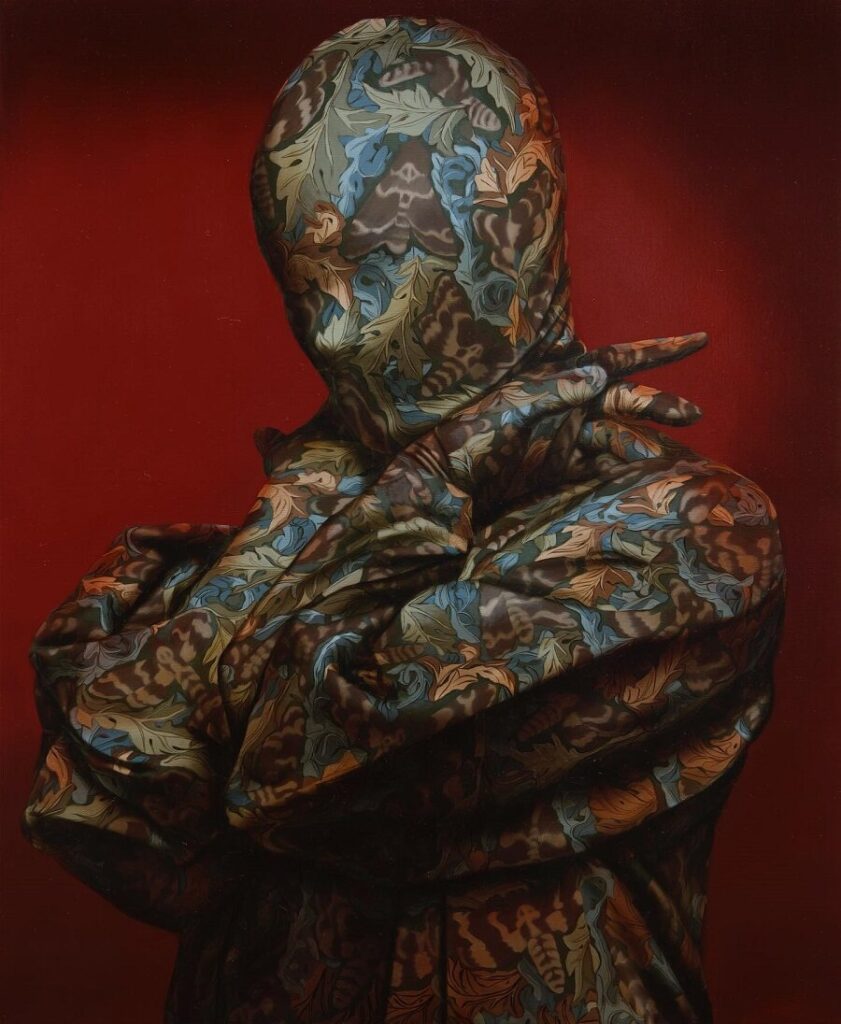
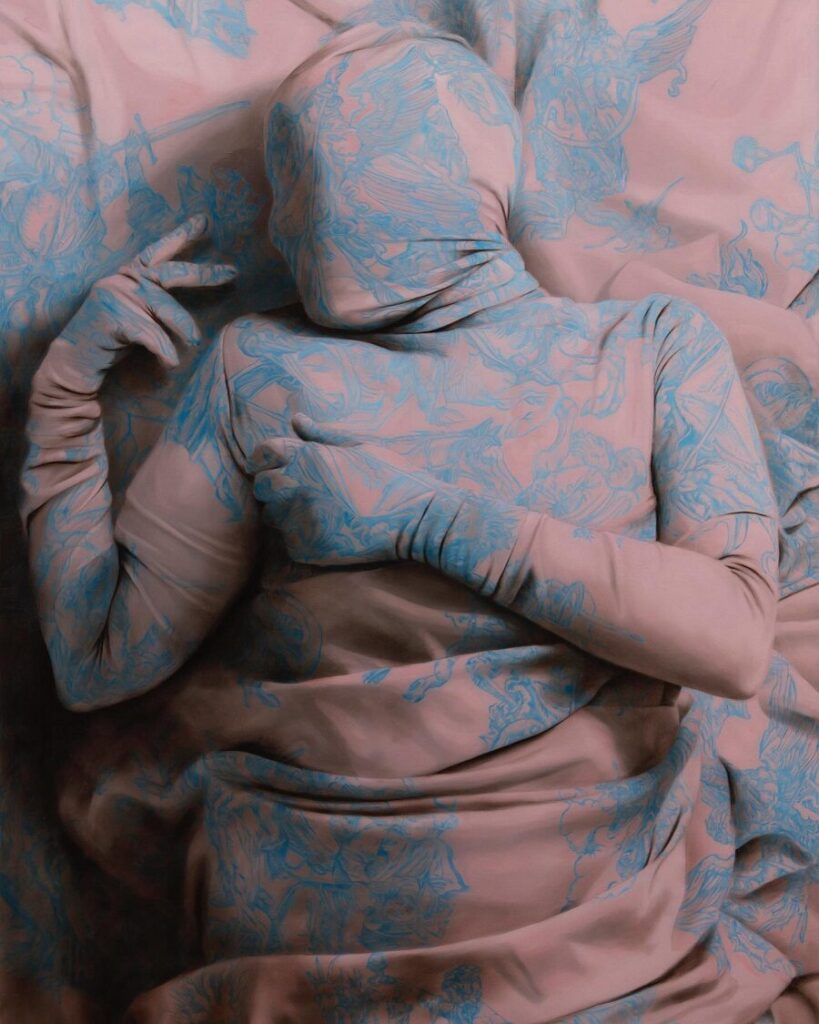
I am drawn to the studio and I love to sit at the easel and just paint.
Exclusive Interview with Markus Åkesson
Hi Markus, congratulations on being selected the 1st Prize Winner of the RAYMAR Traditional Art Award in the 2023 Beautiful Bizarre Art Prize! It’s a pleasure to speak with you and gain further insight into the dynamic realms of your work.
The personal iconography of patterned fabrics and veiled muse establishes a profound narrative in your paintings. I read that you design these fabrics and patterns and as such they’re sewn and used for your models to wear. I find this interconnection fascinating as it blurs the lines not only with your protagonist but as well between the nuances of wearable couture and traditional art.
You made this particular pattern from a famous print by Albrecht Durer, “Witch Riding Backwards On A goat”, which you combined with florals. What can you tell us about the importance of this creative process?
I have always been intrigued by Durer’s work; my interest has particularly been for his esoteric motifs. Making patterns is an important part of my creative process, and is different from painting in the sense that every pattern has a built-in rhythm when it repeats itself. It’s like music in a way.
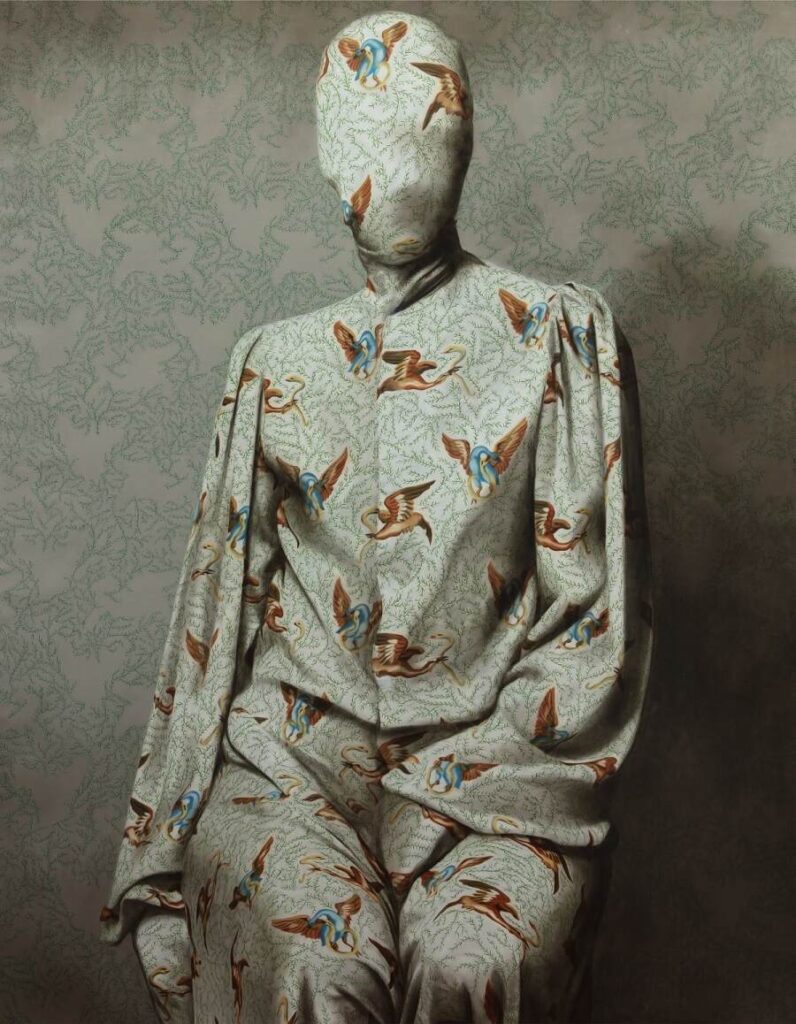
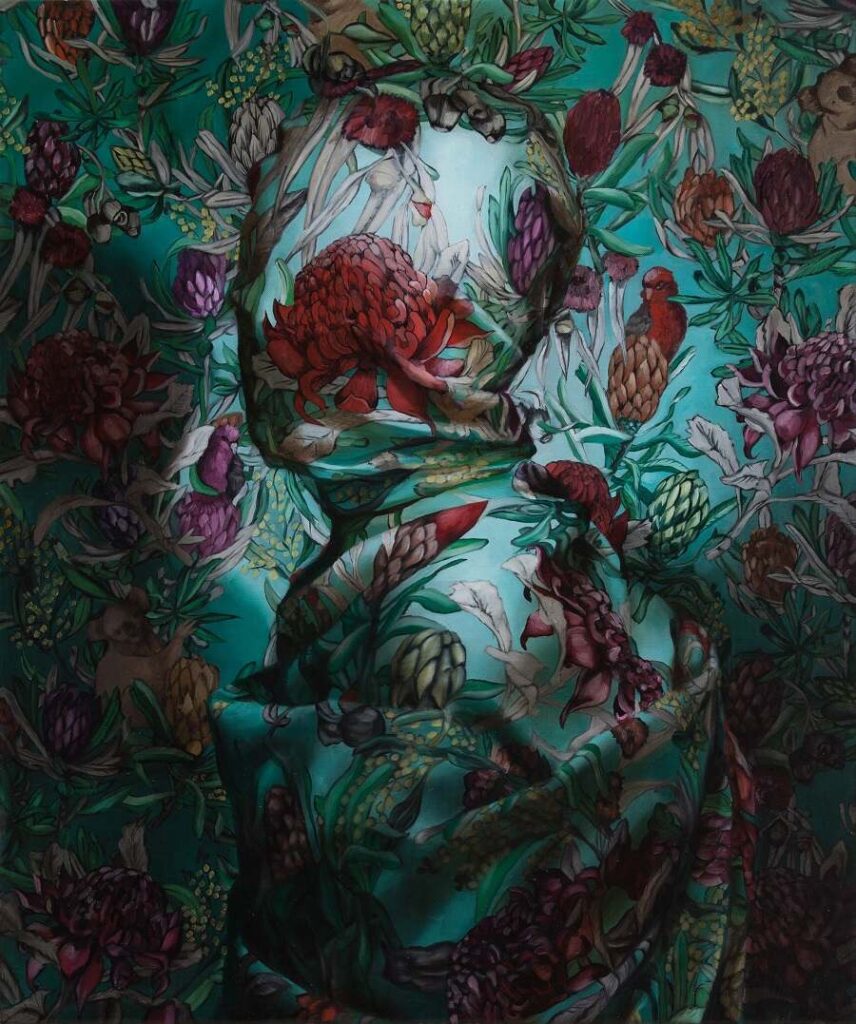
I have always been interested in painting materials, surfaces and patterned textiles. I always went through fabric stores when I was traveling to find new motifs. In the atelier, my assistants helped me to sew the fabric into clothes and creations for the model to wear.
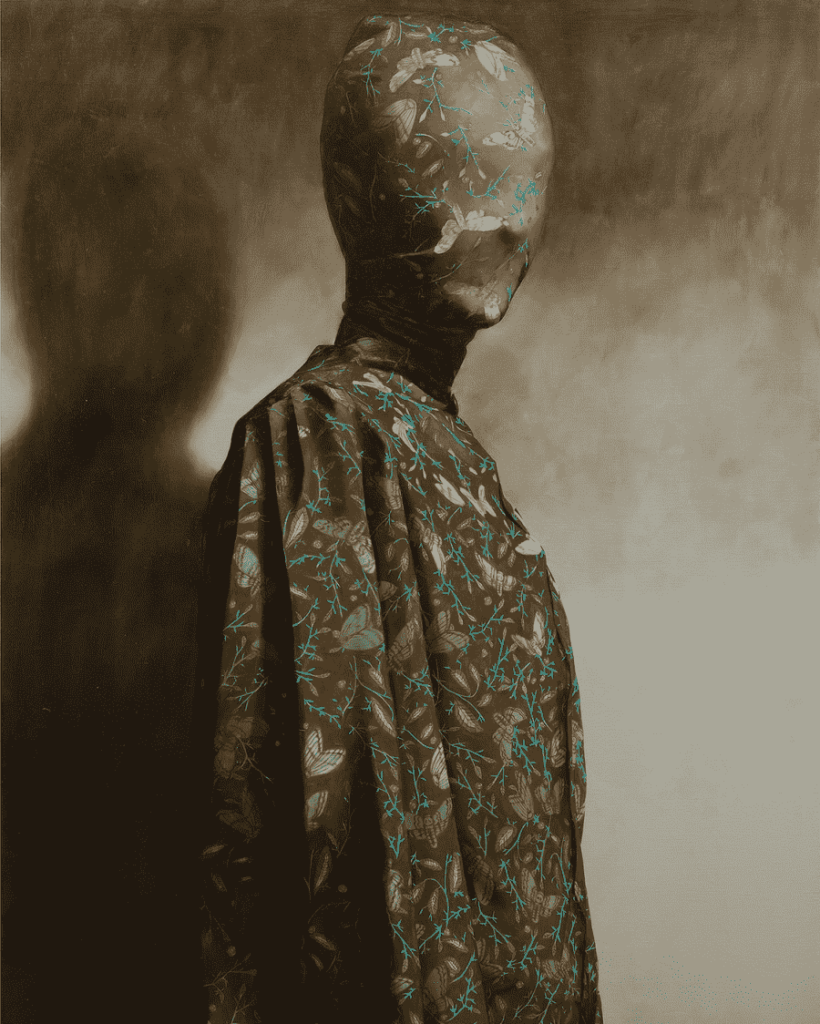
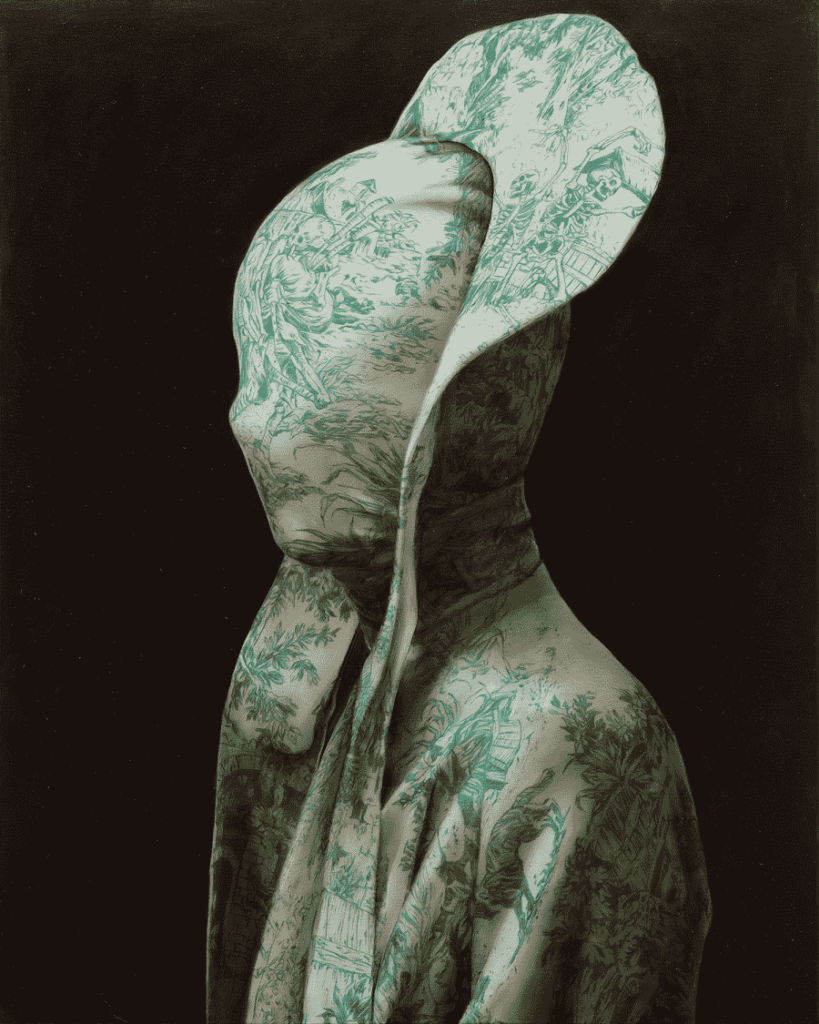
What are some of your most rigorous art practices? And what compels your creative spirit the most?
The process of painting has always been a meditative process for me. I am drawn to the studio and I love to sit at the easel and just paint.
Like a collective memory, you have established a wonderfully cohesive body of work and have exhibited internationally. How have your imaginative faculties evolved over time?
My scenes have changed over time. Ten years ago, when I started to exhibit at Galerie Da-End in Paris, our children were little. They were my models, most of the time, and the motifs were an attempt to understand and take part in their fantasy world. Back then, we used to spend our summers at a family house on an island called Öland, outside the coast of Sweden. There was a beach but also a peculiar forest.
The kids would play with their cousins in the forest, and they made it into their imaginary world. They constructed an imaginary land, Kopetania, with its own history, legends and constitution. As a fascinated spectator, it started a creative process within me, and it was the beginning of a vast series of paintings. This body of work became an attempt to understand their world, to see through their eyes, like I now try to see through Durer’s eyes by using his motifs in my patterns.
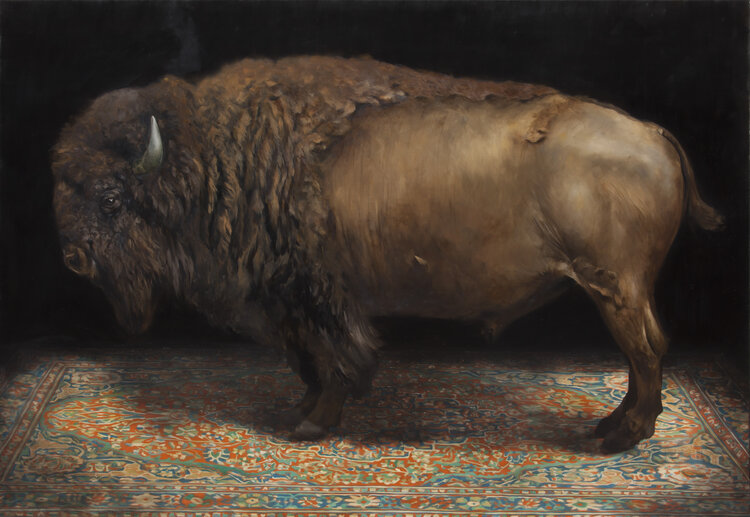
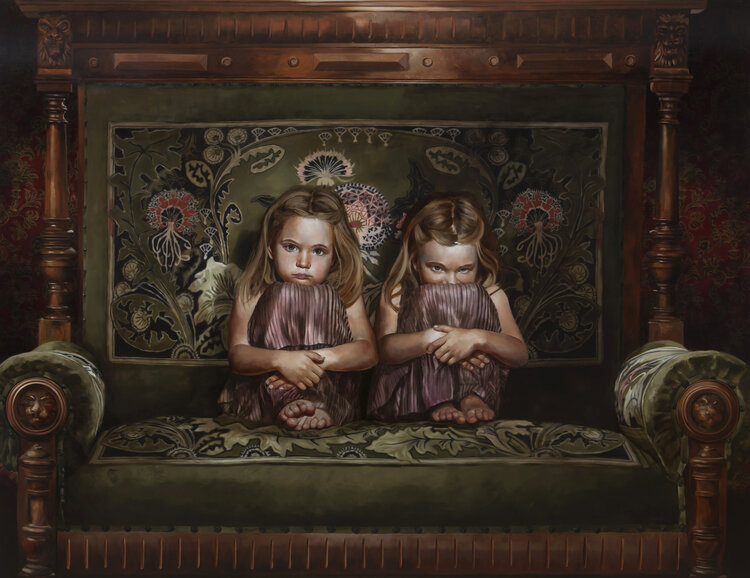
I love the ideation of this imaginary land, Kopetania. Will you describe another place that has become integral to the foundation of your artwork, particularly in regards to the creation of “Witch Riding Backwards (Indigo)”.
I have always been interested in painting materials, surfaces and patterned textiles. I always went through fabric stores when I was traveling to find new motifs. In the atelier, my assistants helped me to sew the fabric into clothes and creations for the model to wear. Initially, I was making paintings where everything in the scene was covered in different patterned fabrics, except the face and sometimes the hands of the models.
I wanted to create the feeling of them being absorbed or even to be drowning in beauty, a kind of Stendhal Effect. Eventually, I covered the face too. Everything about the painting changed. I found myself being intrigued and asked myself what was behind the fabric, even though I was the one painting it. I became even more convinced that I wanted to create my own patterns and fabrics, to control the narrative. So I spent some time learning how to make pattern reports, which is now a big part of my practice.
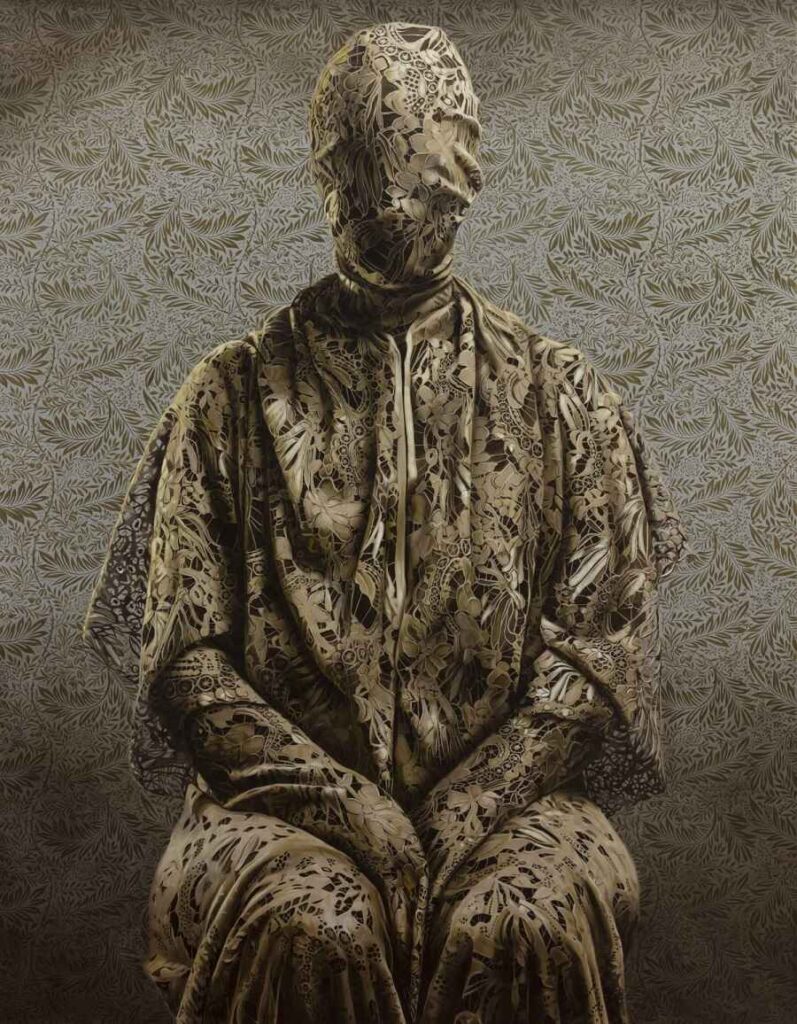
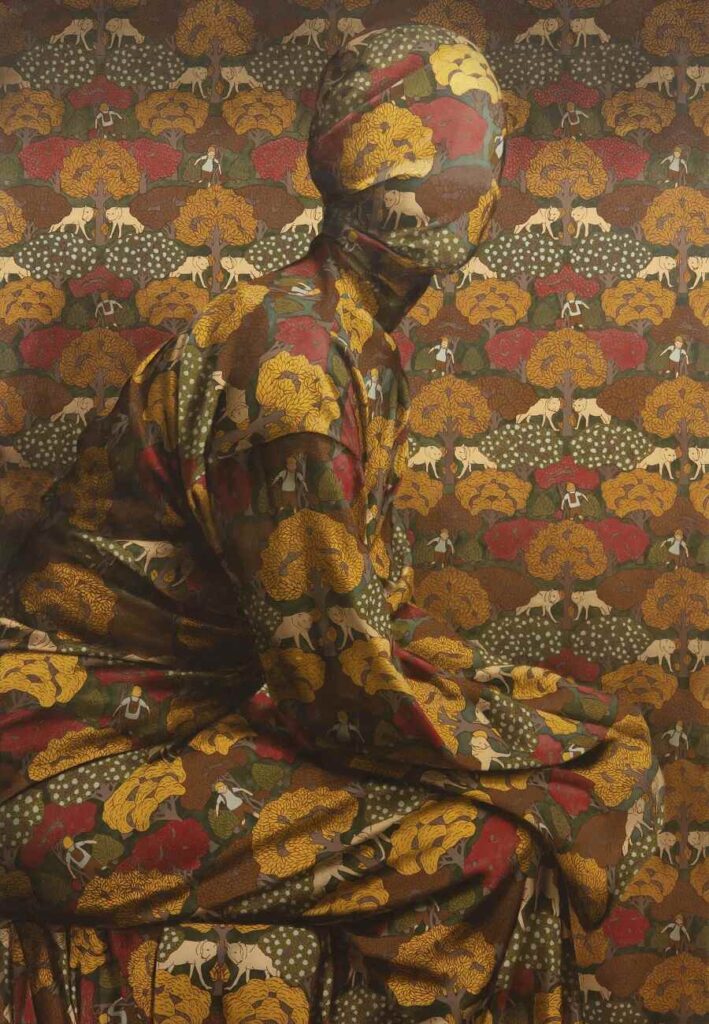
In the same vein, why did this particular painting speak to you above others in terms of submitting it to the Beautiful Bizarre Art Prize?
I think this painting represents this body of work, the ”Now You See Me” series. In color and composition, but in the thematics also, a kind of esoteric foundation.
From conception to completion, would you tell us about your overall vision and what you did to accomplish it? Were there challenges or moments that surprised you?
There are always challenges when creating art. In my case, there is a long process from beginning to completion, and it’s a challenge to have control over all parts. In the beginning of each project, I work very intuitively, then more and more methodically. At the same time, I always try to have an open mind and take care of the accidents and missteps that always occur.
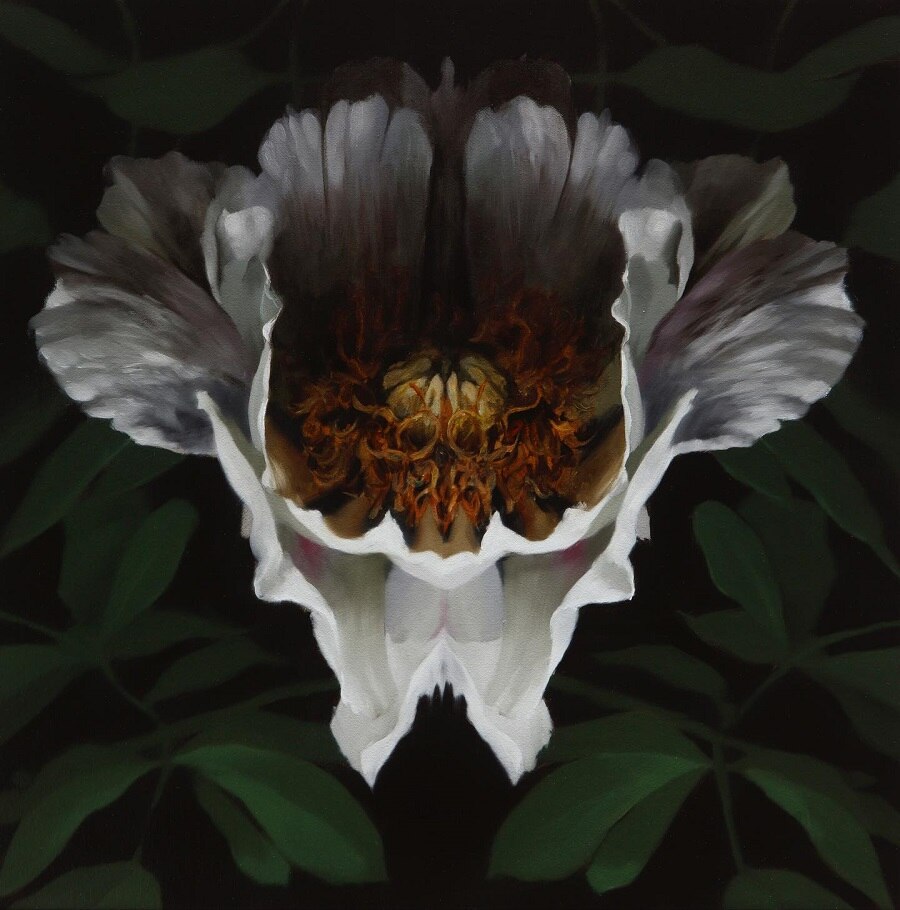
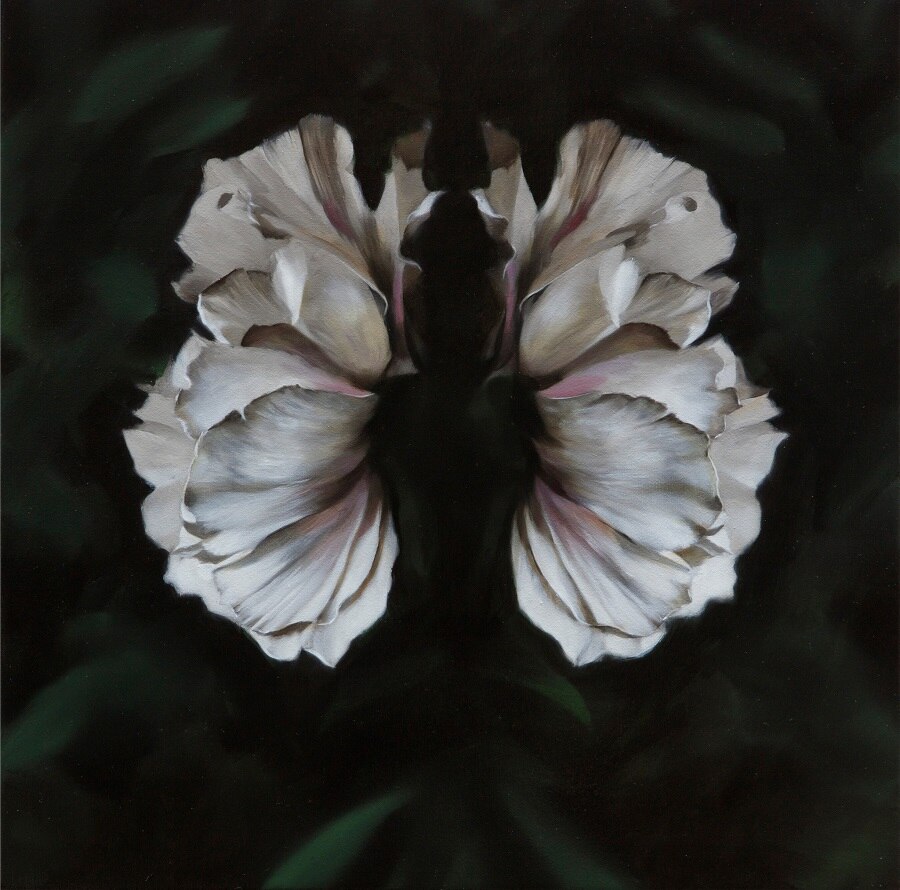
Art, regardless of form or era, shapes expression in ways that are unique and fluent to the individual artist. What impact do you feel the artist contributes to today’s society? And where do you see yourself within those contributions?
Art and cultural expressions are overall what makes us human. In regard to my personal contribution, I would rather leave the assessment to others. My incentive for working has always been to create in a way that interests and fulfills me.
Will you tell us about your exhibitions at Berg Gallery, Stockholm, Sweden and Galerie Da-End, Paris? Any other plans for the rest of the year?
My latest exhibition for Galerie Da-End, with the title ”Roses Of Heliogabalus”, was a series of paintings and sculptures inspired by the myth of Emperor Heliogabalus who let rose petals rain over his dinner guests. Each gathering would surpass the last in splendor. Eventually the guests were suffocated. There is a famous painting by Lawrence Alma-Tadema from 1888 that depicts the scene. Ever since I first saw it, the whole narrative intrigued me.
My recent exhibition at Berg Gallery, ”Weaver´s Grove, The Oracle Bones”, was an attempt to investigate, and reveal the mystics of natural symmetry around us. The motifs in the paintings consisted of mirrored nature and veiled figures in patterned fabrics. There were also two hand cut glass objects and two large scale bronze sculptures.
And last but not least …
Why did you enter the Beautiful Bizarre Magazine Art Prize?
I have long thought of entering the contest. I never expected I would win, that was a wonderful surprise.
What do you feel you have gained from this experience?
I think my work has been showcased to a wider audience.
Would you recommend it and encourage others to enter? If so, why?
Yes, I recommend every artist to enter, it’s a great way to let other people see
your work!


